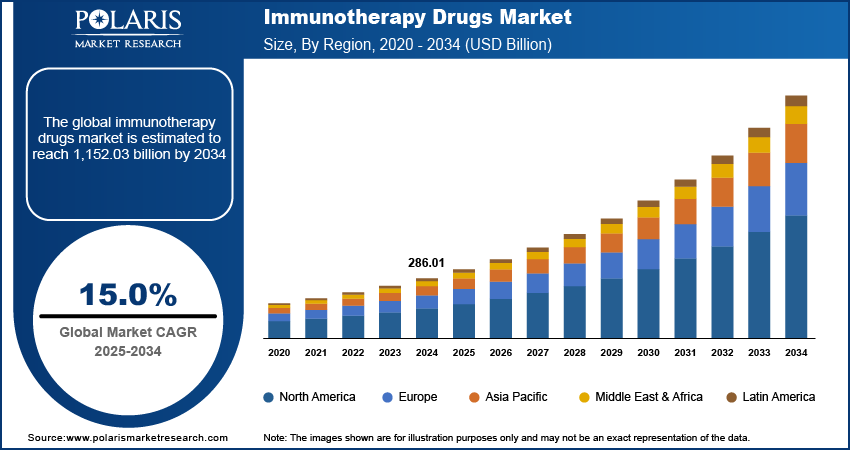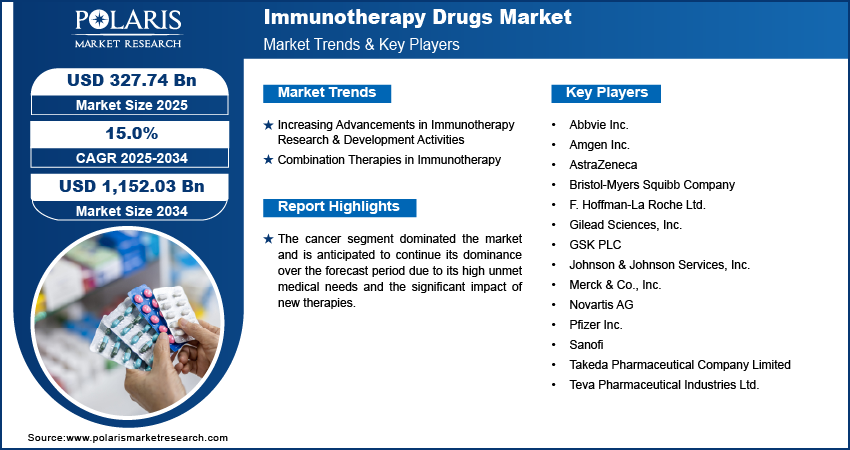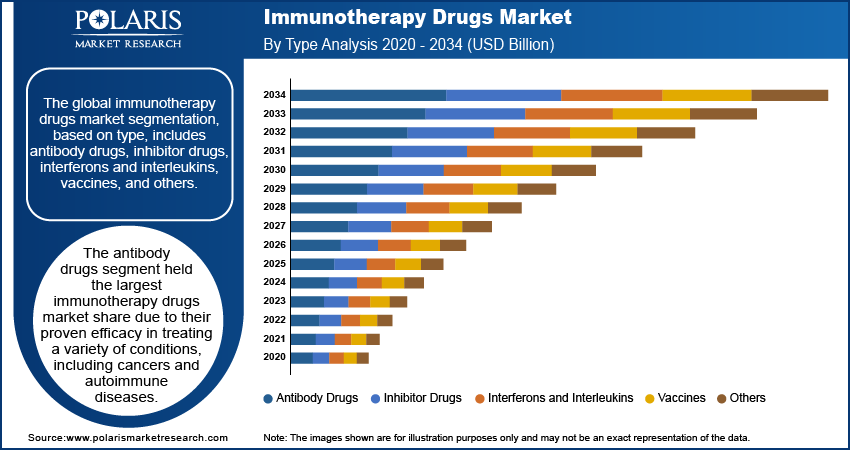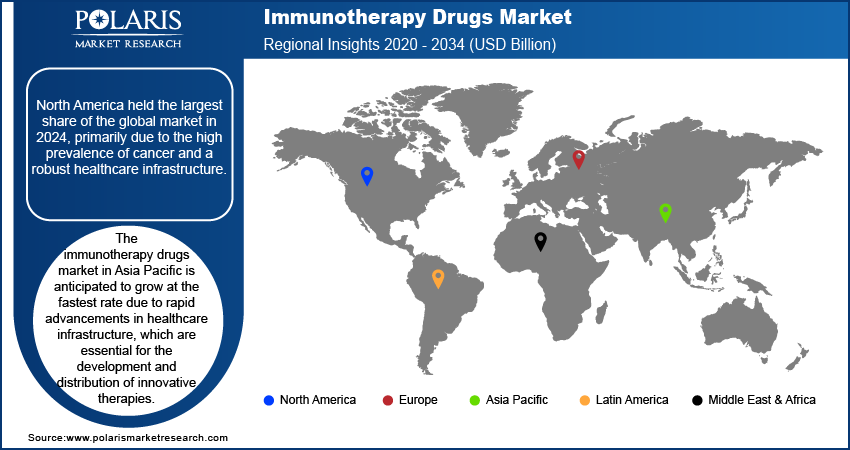
Immunotherapy Drugs Market Size, Share, Trends, Industry Analysis Report: By Type (Antibody Drugs, Inhibitor Drugs, Interferons and Interleukins, Vaccines, and Others), Application, Route of Administration, End User, and Region (North America, Europe, Asia Pacific, Latin America, and Middle East & Africa) – Market Forecast, 2025 - 2034
- Published Date:Dec-2024
- Pages: 120
- Format: PDF
- Report ID: PM5342
- Base Year: 2024
- Historical Data: 2020-2023
Immunotherapy Drugs Market Overview
Global immunotherapy drugs market size was valued at USD 286.01 billion in 2024. It is projected to grow from USD 327.74 billion in 2025 to USD 1,152.03 billion by 2034, exhibiting a CAGR of 15.0% during the forecast period.
The immunotherapy drugs market refers to the therapeutic agents that stimulate or suppress the immune system to combat diseases such as cancer, infections, and autoimmune disorders. These drugs enhance the body’s immune response or modulate its regulatory mechanisms, enabling it to target and eliminate harmful agents or cells effectively.

To Understand More About this Research: Request a Free Sample Report
The immunotherapy drugs market demand is expanding due to the growing global incidence of cancer. According to the World Health Organization (WHO), cancer is one of the leading causes of death, with an estimated 19.3 million new cases and nearly 10 million cancer-related deaths in 2020. Similarly, according to the International Agency for Research on Cancer, in 2022, nearly 20 million new cancer cases and 9.7 million cancer-related deaths were reported, with projections for 2040 reaching 29.9 million cases and 15.3 million deaths globally. Thus, cancer cases are rising, and there is an escalating demand for new and effective treatment options that do not respond well to conventional treatments. Immunotherapy's ability to harness the body's immune system to target and destroy cancer cells specifically has made it a highly sought-after solution, fuelling increased interest and investment in the immunotherapy drugs market.
The surge in demand for immunotherapy drugs is prompting pharmaceutical companies and research institutions to accelerate the development and commercialization of new therapies. For instance, in April 2024, researchers at The University of Texas MD Anderson Cancer Center developed engineered peptides that enhance immune system activation against cancer, offering a promising new direction for immunotherapy drug development. These advanced drug developments in immunotherapy compared to conventional treatments are propelling the immunotherapy drugs market expansion.
Immunotherapy Drugs Market Dynamics
Increasing Advancements in Immunotherapy Research & Development Activities
Advancements in research and development are significantly driving the immunotherapy drugs market growth by continually introducing new and effective treatment options. Innovations such as CAR-T cell therapy, which involves modifying a patient's T cells to target cancer cells, have shown remarkable success in treating certain types of cancer. For instance, in March 2024, The FDA approved Bristol Myers Squibb’s Breyanzi (lisocabtagene maraleucel) as the first CAR T cell therapy for adults with relapsed or refractory chronic lymphocytic leukemia or small lymphocytic lymphoma.
Immune checkpoint inhibitors, which block proteins that prevent immune cells from attacking cancer, are enhancing treatment outcomes and offering new hope for patients with previously hard-to-treat cancers. The development of personalized vaccines tailored to individual patient's unique cancer profiles is a targeted and effective therapy. These approaches are expanding the range of treatment options available and also improving the efficacy and precision of cancer treatments, thereby driving the growth of the immunotherapy market and offering new possibilities for patient care.
Combination Therapies in Immunotherapy
Combination therapies, integrating immunotherapy with other treatment modalities such as chemotherapy or targeted therapies, have shown significant enhancing treatment efficacy by leveraging the strengths of different therapeutic approaches. These combinations overcome resistance mechanisms and improve overall outcomes for patients. This strategy has been particularly effective in treating cancers that are less responsive to single-agent therapies, offering a more comprehensive approach to fighting the disease. For instance, in April 2024, the FDA approved the combination of N-803 with BCG for treating BCG-unresponsive non-muscle-invasive bladder cancer, based on the QUILT 3.032 clinical trial led by UCLA, which demonstrated enhanced survival and efficacy. This combination of drugs for treating particular cancer diseases drives the immunotherapy drug market.
This combined approach expands the immunotherapy drugs market and provides clinicians with a more versatile toolkit for managing complex cancer cases. It allows for personalized treatment plans tailored to individual patient needs, improving the chances of successful outcomes and potentially leading to better survival rates. As a result, the adoption of combination therapies continues to drive market growth.

Immunotherapy Drugs Market Segment Insights
Immunotherapy Drugs Market Assessment by Type Insights
The global immunotherapy drugs market segmentation, based on type, includes antibody drugs, inhibitor drugs, interferons and interleukins, vaccines, and others. The antibody drugs segment held the largest immunotherapy drugs market share due to their proven efficacy in treating a variety of conditions, including cancers and autoimmune diseases. Monoclonal antibodies have shown significant success in targeting specific antigens on cancer cells or immune cells, leading to effective and precise treatment with reduced off-target effects. This effectiveness, combined with their broad application across different types of cancers and chronic diseases, has cemented their dominant position in the market.
Advancements in antibody engineering, such as the development of bispecific antibodies and antibody-drug conjugates, have further enhanced their therapeutic potential and efficacy. For instance, in February 2024, researchers at the University of Pennsylvania developed switchable bispecific antibodies using FDA-approved immunotherapy drugs, which offer a promising advancement in cancer treatment by minimizing on-target off-tumor toxicity and reducing immune system overactivation. Further, an established market presence and a strong pipeline of new antibody drugs in development continue to drive growth in this segment, sustaining its role in the market.
Immunotherapy Drugs Market Assessment by Application Insights
The global immunotherapy drugs market segmentation, based on application, includes cancer, autoimmune and inflammatory diseases, hematology, osteology, neurology, and others. The cancer segment dominated the market and is anticipated to continue its dominance over the forecast period due to its high unmet medical needs and the significant impact of new therapies. Traditional cancer treatments often have limitations, creating a strong demand for innovative approaches. Immunotherapy has demonstrated promising results across various cancer types, such as melanoma and lung cancer, leading to increased interest and investment in this field.
Advancements in research, successful regulatory approvals, and substantial funding have accelerated the development and adoption of cancer immunotherapy. The growing global incidence of cancer further drives the market, making it the largest segment in the immunotherapy drugs market.

Immunotherapy Drugs Market Regional Insights
By region, the study provides immunotherapy drugs market insights into North America, Europe, Asia Pacific, Latin America, and the Middle East & Africa. North America held the largest share of the global market in 2024, primarily due to the high prevalence of cancer and a robust healthcare infrastructure. For instance, the Canadian Cancer Statistics Report in 2022 indicated that approximately 233,900 people were diagnosed with cancer, and over 1.5 million people in Canada are living with or beyond cancer. The significant incidence of cancer in the region drives demand for effective treatment options, while the well-established healthcare system supports advanced research and development. This infrastructure facilitates the rapid approval and adoption of new therapies, enhancing market growth.
Substantial investments in research and technological advancements in biotechnology have led to innovative immunotherapy solutions. The increasing awareness and acceptance of these therapies among healthcare providers and patients further contribute to their widespread adoption, solidifying North America’s leadership in the immunotherapy drugs market.

The immunotherapy drugs market in Asia Pacific is anticipated to grow at the fastest rate due to rapid advancements in healthcare infrastructure, which are essential for the development and distribution of innovative therapies. Additionally, there is a high incidence of diseases, particularly cancer, that are effectively treated with immunotherapy. This growing demand for effective treatment options is further supported by a robust pipeline of clinical trials and research initiatives focusing on immunotherapy, making the region a significant player in this market.
For instance, The Asia Pacific Vaccine and Immunotherapy Congress (APVIC) 2024 took place from May 14 to 17. The event was organized by Immunotherapy@Brisbane, Eradicate Cancer, the Melbourne Immunotherapy Network (MIN), and Australasian Immunotherapy and Vaccine Development. This congress brought together experts in immunotherapy and vaccine research for networking, learning, and collaboration. It provided an opportunity for leaders in the field to share ideas, discuss the latest advancements, and work together towards improving cancer treatment and vaccine development.
Immunotherapy Drugs Key Market Players & Competitive Insights
Leading market players are investing heavily in research and development in order to expand their product lines, which will help the market grow even more. Market participants are also undertaking a variety of strategic activities to expand their global footprint. Important immunotherapy drugs market developments include new product launches, contractual agreements, mergers and acquisitions, higher investments, and collaboration with other organizations. To expand and survive in a more competitive and rising market climate, immunotherapy drugs industry must offer cost-effective items.
Manufacturing locally to minimize operational costs is one of the key business tactics used by manufacturers in the global immunotherapy drugs industry to benefit clients and increase the market sector. In recent years, the immunotherapy drugs industry has offered some technological advancements. The immunotherapy drugs market key players include Abbvie Inc.; Amgen Inc.; AstraZeneca; Bristol-Myers Squibb Company; F. Hoffman-La Roche Ltd.; Gilead Sciences, Inc.; GSK PLC; Johnson & Johnson Services, Inc.; Merck & Co., Inc.; Novartis AG; Pfizer Inc.; Sanofi; Takeda Pharmaceutical Company Limited; and Teva Pharmaceutical Industries Ltd.
AbbVie Inc. is a biopharmaceutical company that specializes in research and development of innovative therapies across various therapeutic areas, including immunology, oncology, and neuroscience. The company has a diverse product portfolio featuring major drugs such as Humira, Skyrizi, and Botox. It is also advancing treatments for autoimmune diseases, cancer, and neurological disorders. In February 2024, AbbVie and OSE Immunotherapeutics partnered to develop OSE-230 for chronic inflammation, with AbbVie securing global rights and OSE receiving up to $713 million in payments and royalties.
AstraZeneca plc is a biopharmaceutical company headquartered in Cambridge, England, specializing in the discovery, development, and commercialization of prescription drugs. The company focuses on various therapeutic areas, including oncology, cardiovascular, respiratory, and neurological diseases, and has a diverse product portfolio that includes biologics and vaccines. In June 2024, AstraZeneca's drug, IMFINZI (durvalumab), was approved in the US for advanced or recurrent mismatch repair deficient endometrial cancer.
List of Key Companies in Immunotherapy Drugs Market
- Abbvie Inc.
- Amgen Inc.
- AstraZeneca
- Bristol-Myers Squibb Company
- F. Hoffman-La Roche Ltd.
- Gilead Sciences, Inc.
- GSK PLC
- Johnson & Johnson Services, Inc.
- Merck & Co., Inc.
- Novartis AG
- Pfizer Inc.
- Sanofi
- Takeda Pharmaceutical Company Limited
- Teva Pharmaceutical Industries Ltd.
Immunotherapy Drugs Market Developments
June 2024: The FDA approved Merck’s KEYTRUDA (pembrolizumab) combined with carboplatin and paclitaxel, followed by KEYTRUDA alone, for treating adult patients with primary advanced or recurrent endometrial carcinoma.
May 2024: The FDA approved Bristol Myers Squibb’s Breyanzi (lisocabtagene maraleucel) as a CAR T cell therapy for adult patients with relapsed or refractory mantle cell lymphoma.
March 2023: The FDA has approved Roche’s VENTANA PD-L1 (SP263) Assay to identify non-small cell lung cancer patients eligible for treatment with Regeneron’s Libtayo (cemiplimab).
Immunotherapy Drugs Market Segmentation
By Type Outlook
- Antibody Drugs
- Inhibitor Drugs
- Interferons and Interleukins
- Vaccines
- Others
By Application Outlook
- Cancer
- Autoimmune and Inflammatory Diseases
- Hematology
- Osteology
- Neurology
- Others
By Route of Administration Outlook
- Intravenous
- Subcutaneous
- Oral
- Others
By End User Outlook
- Hospitals
- Long-Term Care Facilities
- Others
By Regional Outlook
- North America
- US
- Canada
- Europe
- Germany
- France
- UK
- Italy
- Spain
- Netherlands
- Russia
- Rest of Europe
- Asia Pacific
- China
- Japan
- India
- Malaysia
- South Korea
- Indonesia
- Australia
- Vietnam
- Rest of Asia Pacific
- Middle East & Africa
- Saudi Arabia
- UAE
- Israel
- South Africa
- Rest of Middle East & Africa
- Latin America
- Mexico
- Brazil
- Argentina
- Rest of Latin America
Immunotherapy Drugs Report Scope
|
Report Attributes |
Details |
|
Market Size Value in 2024 |
USD 286.01 billion |
|
Market Size Value in 2025 |
USD 327.74 billion |
|
Revenue Forecast in 2034 |
USD 1,152.03 billion |
|
CAGR |
15.0% from 2025 – 2034 |
|
Base Year |
2024 |
|
Historical Data |
2020 – 2023 |
|
Forecast Period |
2025 – 2034 |
|
Quantitative Units |
Revenue in USD billion and CAGR from 2025 to 2034 |
|
Report Coverage |
Revenue Forecast, Market Competitive Landscape, Growth Factors, and Industry Trends |
|
Segments Covered |
|
|
Regional Scope |
|
|
Competitive Landscape |
|
|
Report Format |
|
|
Customization |
Report customization as per your requirements with respect to countries, regions, and segmentation. |
FAQ's
The global immunotherapy drugs market size was valued at USD 286.01 billion in 2024 and is anticipated to reach at USD 1,152.03 billion in 2034.
The global market is projected to grow at a CAGR of 15.0% during the forecast period, 2024-2032.
North America had the largest share in the global market.
The key players in the market are Abbvie Inc.; Amgen Inc.; AstraZeneca; Bristol-Myers Squibb Company; F. Hoffman-La Roche Ltd.; Gilead Sciences, Inc.; GSK PLC; Johnson & Johnson Services, Inc.; Merck & Co., Inc.; Novartis AG; Pfizer Inc.; Sanofi; Takeda Pharmaceutical Company Limited; and Teva Pharmaceutical Industries Ltd.
The antibody drugs category dominated the market in 2024
The cancer had the largest share in the global market.
